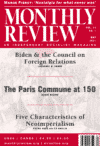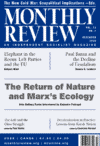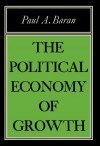Europe

In 1884, important figures in England’s budding socialist movement broke with the Social Democratic Federation over concealed jingoism and strong support for the British Empire. A similar division within the broad left on the issue of imperialism is threatening to reappear in our time. | more…

Today the political visibility of the Paris Commune is not at all evident. At least, that is, if what we mean by “today” is the moment when we have to take up the challenge of thinking politics outside its subjection to the state and outside the framework of parties or party.… And yet the Commune was a political sequence that, precisely, did not situate itself in such a subjection or in such a framework. [To tackle] the political facts and determinations of the Commune…[it is necessary to utilize] a completely different method…[than that of the classical interpretation]. | more…

Encountering Marx and Joyce
“In the mid-1990s, when I lived in central London, I used to walk past the British Museum nearly every day. More often than not, I would pop in, did so for years, getting thrilled by a couple of things. The first was entering the great Reading Room, for which I had a Reader’s Card, glimpsing and even sitting in space G-7. I never ordered any books, had no need to order anything; all I wanted was to sit there, in Karl Marx’s seat, and try to feel the vibe. Usually, there was no vibe, only the hushed shuffling and page turning of others close by, mixed with the odd cough and splutter.” | more…

Álvaro Cunhal's Five Days, Five Nights
A prolific political writer, Álvaro Cunhal—leader of Portugal’s Communist Party for half a century and central figure of the 1974 Carnation Revolution—revealed in 1994 that he had also written several novels under the pseudonym Manuel Tiago. One of these novels, Five Days, Five Nights, was only translated into and published in English in 2020. The novella manages to capture the complexities, loneliness, and bravery of ordinary people, highlighting how we are the ones who keep us safe. | more…

We remember our good friend and comrade, Leo Panitch, one of the great socialist intellectuals of all time, who died on December 19, 2020, age 75. | more…

Colonialism before the First World War
The Western European powers appropriated economic surplus from their colonies, materially and substantially aiding their own industrial transition from the eighteenth century onward, as well as the diffusion of capitalism to the regions of new European settlement. In the case of India, the concept of drain is based on the fact that a substantial part of its earnings was never permitted to accrue to the country; it was instead appropriated by the ruling power: Britain. | more…

Coexistence in Alexander Bogdanov's Utopia
Alexander Bogdanov’s Red Star, published in 1908, was an attempt to reenergize the dejected revolutionaries whose efforts had been crushed during the 1905 Russian Revolution. The protagonist, Leonid, is a Russian revolutionary chosen, in the midst of the revolution, by the Martian expedition to visit their planet and learn about the centuries-old advanced form of communism there. Since the triumph of communism in Russia was the cause to which Leonid had decided to devote his life, he agrees to visit Mars so that he can absorb their ideas and principles. | more…

A historical-materialist analysis of the relationship between disability, the body, welfare, and capitalism is needed in order to further develop a Marxist understanding of disability. In this framework, we can see how the British welfare state, given recent changes to British disability policy, determines who is able-bodied and who is disabled, with this evaluation made in regard to the needs of monopoly capitalism. | more…

Every year since 1964, the Socialist Register has offered a fascinating survey of movements and ideas from the independent new left. This year’s edition asks readers to explore just how we need to live with new technologies. Essays in this 57th Socialist Register reveal the contradictions and dislocations of technological change in the twenty-first century. And they explore alternative ways of living: from artificial intelligence (AI) to the arts, from transportation to fashion, from environmental science to economic planning. | more…

The United States is now in a New Cold War with Russia and China, with the focus increasingly on the latter and involving a direct challenge to U.S. hegemony over the world economy. | more…
Left Parties and the European Union
European left parties have, over the last couple of decades, become increasingly critical of political developments in the European Union, particularly as a response to the austerity policies that followed the financial crisis of 2007–08 and the subsequent euro crisis. These were accompanied by high and sustained unemployment and promises of a social pillar that never materialized. Nevertheless, even if criticism of the European Union has sharpened, this has not been well reflected in the political strategies of the left. | more…

Recently published and estimated historical data illustrate that economic surplus declined during the thirteenth and fourteenth centuries in England, helping explain the “crisis of feudalism” that started in the thirteenth century. It was not until several centuries later, when capitalism became the dominant economic system, that the economic surplus began to rise on a consistent basis, due to the reinvestment of a portion of the surplus into productive activities, a greater ratio of capital income to rental income, and a greater ratio of investment to economic surplus. | more…










